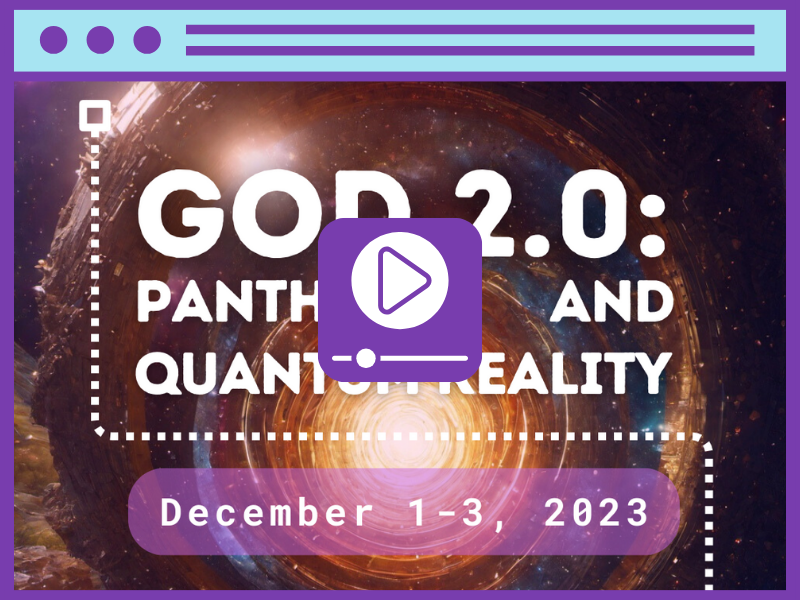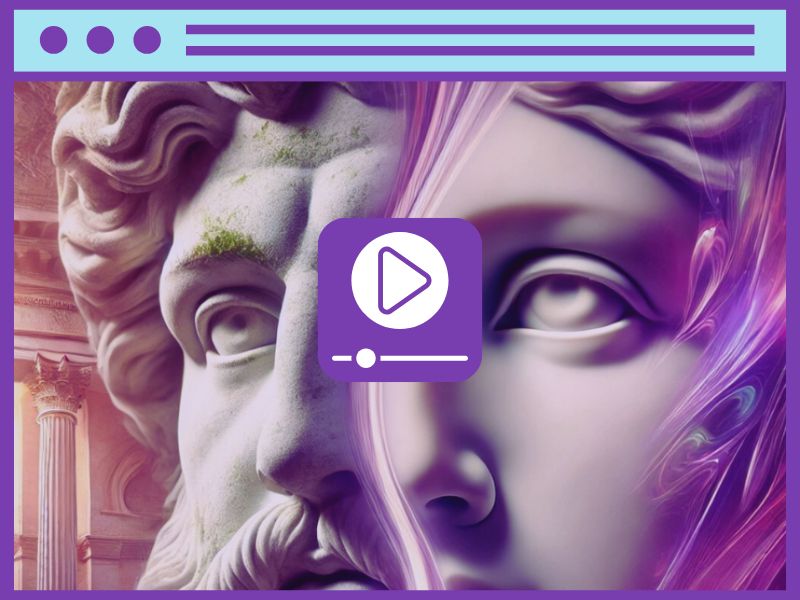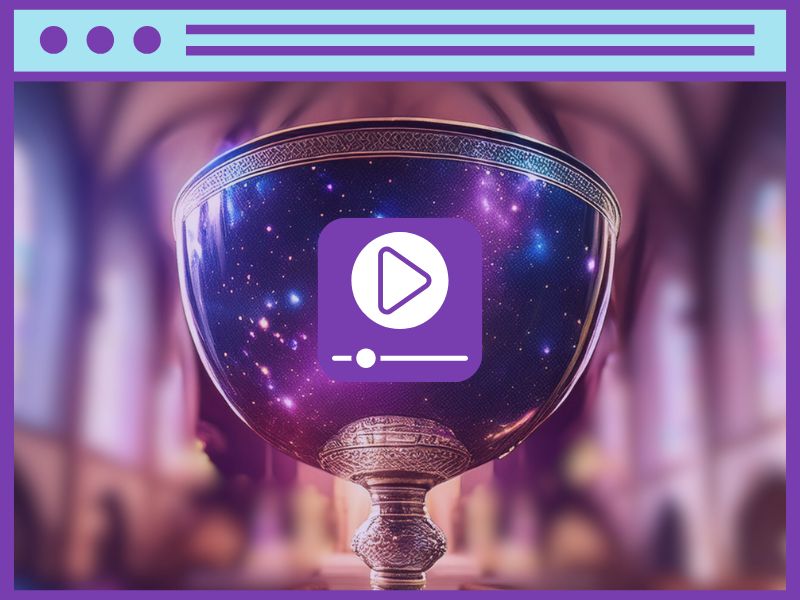
God 2.0: Pantheism and Quantum Reality
$95.00
A Center for Christogenesis annual conference held virtually December 1–3, 2023.
“God is the newest thing there is, the youngest thing, and when we are united with God, we become new again.” Meister Eckhart
Can God be updated? Classic theism would say, “absolutely not!” But God is an incomprehensible mystery and our approach to the mystery is shaped by ways of knowing the real, a type of knowledge that cannot be fixed or located in any one age. We will explore how science, culture and scripture can help us appreciate a wider, more expansive understanding of God in ways that empower us to creatively contribute to the wholeness we seek.
Presentations
John D. Caputo, the Cook Professor of Philosophy Emeritus (Villanova University) and the Watson Professor of Religion Emeritus (Syracuse University), is a hybrid philosopher/theologian who works in the area of “weak” or “radical” theology, drawing upon hermeneutic and deconstructive theory. His most recent books are What to Believe: Twelver Brief Lessons in Radical Theology (2023) and Specters of God: An Anatomy of the Apophatic Imagination (2022). His The Weakness of God: A Theology of the Event (2006), won the American Academy of Religion award for excellence in the category of constructive theology.
Something Spooky is Going On: Taking a Quantum Approach to God
Taking my point of departure from Tillich’s “Two Types of the Philosophy of Religion,” I argue that the two types, the cosmological (theist) and ontological (panentheist), also describe the difference between the respective logics of Newtonian and quantum physics, that the world of quantum reality abides by the logic of the ontological, of ground and grounded, not of the cosmological, of cause and effect. The result is that quantum physics lends encouragement to the imaginative theological figure of the “ground of being” by providing it with a scientific analogate, a mathematical companion or amicus curiae. I proceed from there to propose still a third type, which draws its inspiration from the ontological but moves beyond it. In the third type, one of the possibilities at play in the ground of being is the possibility of the impossible. This is a spooky effect with which we are especially entangled, and we take the risk of saying that it goes under the name (of) “God,” whose actualization or realization or materialization is up to us. The third type of the philosophy of religion, which is the discourse proper to the spooky things going on in the name (of) “God,” is not cosmological or ontological but hauntological.
Brandon Ambrosino
Brandon Ambrosino is a doctoral candidate in theology and ethics at Villanova University, where he is completing a dissertation that teases out the theological implications of camp theory. In addition to his academic career, Brandon has published a variety of journalistic articles and essays in a wide range of publications, including Politico, New York Times, Boston Globe, BBC, The Atlantic, Globe & Mail, Smithsonian, The Economist, and Playboy (which he only reads for the articles). Brandon’s interests are probably more eclectic than his advisors want them to be, but the persistent theme of his work is his ornery knack for, as Susan Sontag famously put it, dethroning the serious.
Gods who Rise, Fall, and Become: Psalm 82 and Entangled Love
Hailed as one of the most remarkable texts of the Hebrew Bible, Psalm 82 narrates a history of God’s becoming. If God is, as Northrop Frye once put it, “a verb implying a process accomplishing itself,” this psalm offers a theopoetic exploration of this process. Unlike the other gods whose death he announces, the One God who emerges from Psalm 82 achieves his godness by out-loving every other deity. God’s character, we learn, is not the result of his being; God is, in fact, only because he first loves. In the order of being, compassion is primary. Given the priority it places on the entanglement of ontology and ethics, Psalm 82 offers us a biblical parable for reflecting on Karen Barad’s ethic-onto-epistemology. By making a Baradian cut that other gods have failed to make, a cut that allows orphans and widows to come to matter, God becomes God. And we, who discover ourselves to be held in his estate, become those who both invite and persuade him to arise.
Bruce Epperly
Bruce Epperly is a pastor, professor, author, spiritual guide, and author of over seventy books in theology, spirituality, ministerial wholeness, scripture, healing, religion and politics, and congregational transformation, including The Elephant is Running: Process and Open and Relational Theology and Religious Pluralism, Jesus: Mystic, Healer, and Prophet, Walking with Francis of Assisi: From Privilege to Activism, and Messy Incarnation: Reflections on Christ in Process. While “retired” from full-time ministry and teaching, Bruce continues to teach at Wesley Theological Seminary and gives seminars throughout North America on theology, spirituality, Christianity and pluralism, and clergy well-being and retirement. An avid walker and committed grandparent and supporter of our children’s future, he describes his approach as “theospirituality,” the joining of mysticism, spiritual practices, contemplative activism, and theological reflection. He writes a weekly lectionary commentary, “The Adventurous Lectionary” for patheos.com and contributes to the Process and Faith lectionary commentary series.
The God, Theology, and Spirituality of Tradition and Tomorrow: 2.0 and Beyond
Pierre Teilhard de Chardin challenges us to seek the God of Tomorrow. In similar fashion, Alfred North Whitehead asserts that the pure conservative fighting against the essence of the universe, including God’s evolutionary aim at the production of Beauty. Many people connect scripture with a static, unchanging, and backward-looking vision of God and spirituality. In contrast, I see scripture as describing the God of Tomorrow who constantly is doing a new thing and whose mercies are new every morning. Scripture belongs to the creative and adventurous and not just to the fundamentalist fixation on the changelessness of Yesterday’s God and outmoded ethics, science, and spirituality. Scripture describes God as the ultimate adventurer who inspires our personal and communal adventures.
Grounded in a career of over four decades of creative synthesis of academic theology and pastoral ministry, I explore the interplay of divine faithfulness and divine innovation through the lens of Lamentations 3:22-24 and its affirmation that “The steadfast love of God never ceases, God’s mercies never come to an end; they are new every morning; great is your faithfulness.” The God described in this passage inspires an adventurous, innovative, and inclusive theology, taking us not only to a vision of God and Spirituality 2.0 but to 3.0 and an ever-expanding spiral of divine love and creativity in partnership with creaturely love and creativity.
Theological reflection and spiritual formation grounded in the ever-expanding and ever-creative love of God preaches, teaches, heals, and transforms persons, communities, and the planet.
Catherine Keller
Catherine Keller, PhD is George T. Cobb Professor of Constructive Theology in The Graduate Division of Religion, Drew University. She works amidst the tangles of ecosocial, pluralist, feminist philosophy of religion and theology—and always as a process thinker. Her books include Face of the Deep; On the Mystery; Cloud of the Impossible; Political Theology of the Earth. She has co-edited several volumes of the Drew Transdisciplinary Theological Colloquium, most recently Political Theology on Edge: Ruptures of Justice and Belief in the Anthropocene. Her latest monograph is Facing Apocalypse: Climate, Democracy and Other Last Chances.
Earth Matters: Generation, Motivation, Eco-civilization
Earth matters because it is the active ground of what we are—precisely not in the sense of a boringly mindless matter. A matter at base inert, lifeless, flat, “stuff”—that’s the materialism of the modern world since Newton. That old modern materialism has progressed triumphantly into the postmodern capitalist world as the stuff to be consumed. But the so-called “new materialism” works constructively with the ecological meaning of matter. Matter is not merely understood as substance or stuff but as process, an active process of materialization.
Rami Shapiro
Rabbi Rami Shapiro is an award–winning author of over thirty-six books on religion and spirituality. He received rabbinical ordination from the Hebrew Union College–Jewish Institute of Religion and holds a PH.D. in religion from Union Graduate School. Rami co-directs the One River Foundation (www.oneriverfoundation.org), and is a Contributing Editor at Spirituality and Health magazine where he writes the Roadside Assistance for the Spiritual Traveler column and hosts the magazine’s podcast, Spirituality & Health with Rabbi Rami (spiritualityhealth.com).
Altz iz Gott: God is Everything
Torah is an anthology of insights into the nature of life and how best to live it presented in a variety of literary forms by a diverse group of authors over centuries. Some of these authors were dualists, others non-dualists; some were theists, others pantheists, and panentheists. In this presentation, Rabbi Rami, himself a panentheist, explores The I AM/Ehyeh that is Everything/YHVH revealed in Exodus 3:14-15.
Ilia Delio
Ilia Delio, OSF, PhD is a Franciscan Sister of Washington, DC and American theologian specializing in the area of science and religion, with interests in evolution, physics and neuroscience and the import of these for theology.
Ilia currently holds the Josephine C. Connelly Endowed Chair in Theology at Villanova University, and is the author of twenty books including Care for Creation (coauthored with Keith Warner and Pamela Woods) which won two Catholic Press Book Awards in 2009, first place for social concerns and second place in spirituality. Her book The Emergent Christ won a third place Catholic Press Book Award in 2011 for the area of Science and Religion. Her recent books include The Unbearable Wholeness of Being: God, Evolution and the Power of Love (Orbis, 2013), which received the 2014 Silver Nautilus Book Award and a third place Catholic Press Association Award for Faith and Science. Ilia holds two honorary doctorates, one from St. Francis University in 2015, and one from Sacred Heart University in 2020.
Can God be “Upgraded?”: Lessons from Science about God
The classical monotheistic claim is that God is divine Being unlike created being. God is Being itself, the essence of existence. Medieval scholars attributed to God the qualities of immutability, omniscience and omnipotence, among others. God is unchangeable, all-knowing and all-powerful. But what if God is none of these? After all, if God is Being itself and science tells us that being is chaotic, uncertain, unfolding and entangled, then what is God? We will discuss the urgency to upgrade theology, particularly in light of quantum physics and artificial intelligence. Meister Eckhart wrote: “God is the newest thing there is, the youngest thing, and when we are united with God, we become new again.” We will use Eckhart’s insight to discuss theogenesis and the import of an unfinished God for a techno-driven world.
Frank and Mary Frost
Frank and Mary Frost are independent documentary filmmakers with more than 40 years of experience. Frank earned a Ph.D. in Cinema from the University of Southern California. Mary is a journalism graduate of the University of Toledo and was a syndicated reporter on Capitol Hill before joining Frank Frost Productions. The Frosts have just finished a film on the life of Teilhard de Chardin for public television. The 2-hour television biography relies heavily on Teilhard’s own words and those of his correspondents. Interviews with noted Teilhard scholars provide context and interpretation. Filming in the major locations where Teilhard lived and worked took the Frosts to France, England, and China. “The Evolution of Pierre Teilhard de Chardin” is the first ever documentary on Teilhard for American television.
Diarmuid O’Murchu
Diarmuid O’Murchu is a social psychologist and retired missionary, having worked internationally in the area of Adult Faith Development. Author of several books, including Quantum Theology and Ancestral Grace.
Grounding Evolutionary Consciousness in our Time
Ever since the visionary work of Teilhard de Chardin, Evolution has become an ever more central feature of our understanding of life at every level. In our time Sr. Ilia Delio has brought that awareness to a new level of coherence and conviction. How to ground that vision still remains a formidable challenge, particularly for the emerging spirituality of the 21st century.


